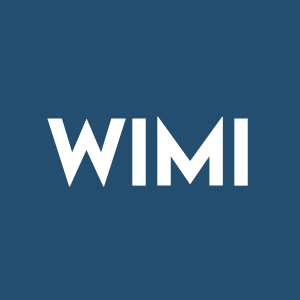WiMi Leverages Quantum Supremacy to Break Through Data Limitations in Machine Learning
Rhea-AI Summary
WiMi (NASDAQ: WIMI) announced on October 15, 2025 the development of a Quantum Semi-Supervised Learning (QSSL) framework that uses claimed quantum supremacy to address limited labeled data and computational bottlenecks in machine learning.
The release describes three core components: a quantum matrix product estimation algorithm, a quantum self-training Propagation Nearest Neighbor classifier, and a quantum semi-supervised K-means clustering algorithm. WiMi says the quantum-classical hybrid approach shortens training time, enables larger dataset processing via parallelism, and aims to improve classification and clustering accuracy. No financial metrics, commercialization timeline, or binding contracts were disclosed.
Positive
- None.
Negative
- None.
News Market Reaction
On the day this news was published, WIMI declined NaN%, reflecting a moderate negative market reaction. Argus tracked a peak move of +7.1% during that session. Our momentum scanner triggered 8 alerts that day, indicating moderate trading interest and price volatility.
Data tracked by StockTitan Argus on the day of publication.
Quantum Semi-Supervised Learning is the quantum version of classical semi-supervised learning. The key to classical semi-supervised learning lies in the ability to train models using a combination of a small amount of labeled data and a large amount of unlabeled data. However, the effectiveness of this approach depends heavily on the demand for computational resources, especially when dealing with massive amounts of data. Quantum computing, with its parallel processing capabilities, can effectively alleviate this computational bottleneck, allowing more data to be processed in the same amount of time.
The Quantum Semi-Supervised Learning framework proposed by WiMi leverages the advantages of quantum supremacy to overcome two major challenges faced by classical machine learning: first, the scarcity of labeled data, and second, the limitation of computational resources. In this framework, quantum computing processes large volumes of unlabeled data through its efficient parallel processing capabilities and uses quantum algorithms to efficiently infer label information, significantly improving learning efficiency.
To support the implementation of this Quantum Semi-Supervised Learning framework, WiMi has designed a straightforward quantum matrix product estimation algorithm. Matrix multiplication is an essential operation in machine learning, and traditional classical matrix multiplication algorithms face issues with high computational complexity and time consumption when dealing with large-scale data. By incorporating quantum computing, WiMi's quantum matrix product estimation algorithm utilizes quantum superposition and interference effects to accelerate matrix operations at an exponential rate. This acceleration not only improves computational efficiency but also allows for the processing of larger datasets through parallelized computations, providing stronger computational support for quantum semi-supervised learning.
In WiMi's Quantum Semi-Supervised Learning framework, the Quantum Self-Training Algorithm is a key component. WiMi has developed a quantum-based "Propagation Nearest Neighbor Classifier" that can efficiently leverage the advantages of quantum computing for self-training. In traditional semi-supervised learning methods, classifiers are trained using a small amount of labeled data and then rely on unlabeled data for inference. The quantum self-training algorithm, on the other hand, uses quantum superposition and interference to rapidly propagate information, enabling efficient classification of unlabeled data. In this process, the parallelism and superposition properties of quantum computing allow the algorithm to process massive amounts of unlabeled data in a very short time, significantly improving both model training efficiency and prediction accuracy. Compared to traditional methods, the quantum self-training algorithm not only offers speed advantages but also can handle more complex and high-dimensional datasets.
Another key technology developed by WiMi is the Quantum Semi-Supervised K-Means Clustering Algorithm. In traditional K-means clustering, data points are divided into K cluster centers, and through iterative optimization, the data points are assigned to the most optimal clusters. However, the limitations of the classical K-means clustering algorithm lie in its computational load and convergence speed. The Quantum Semi-Supervised K-Means Clustering Algorithm leverages the high-speed properties of quantum computing to quickly calculate the positions of cluster centers in each iteration and accelerates the convergence process through quantum interference effects.
With quantum computing, each step of the K-means clustering calculation can be executed in parallel on a quantum computer, significantly improving the efficiency of the algorithm. Compared to classical algorithms, the Quantum Semi-Supervised K-Means Clustering can handle larger datasets within the same amount of computation time and, when dealing with complex data structures, it can offer higher clustering accuracy.
In WiMi's Quantum Semi-Supervised Learning framework, the key technological implementation logic is the organic integration of quantum algorithms and classical algorithms. First, the quantum matrix product estimation algorithm accelerates the fundamental computations, enabling subsequent learning tasks to be completed in an extremely short time. Then, the quantum self-training algorithm and the quantum semi-supervised K-means clustering algorithm play roles in classification and clustering tasks, respectively, utilizing the parallelism and efficiency of quantum computing to significantly improve the speed and accuracy of model training and inference.
The core of this framework lies in the close integration of quantum computing and classical machine learning methods. During the training process, quantum algorithms are responsible for efficiently processing the data, while classical algorithms perform model optimization based on the data processing. Through this quantum-classical hybrid approach, WiMi's Quantum Semi-Supervised Learning framework not only fully leverages the advantages of quantum computing but also avoids the limitations of current quantum computing technologies, which are still immature.
WiMi leverages quantum supremacy to implement Quantum Semi-Supervised Learning technology, which offers a clear time advantage over classical methods when dealing with large-scale datasets. Through quantum computing, our algorithms are able to complete training in a shorter time and provide more accurate classification and clustering results. The time complexity of the quantum self-training algorithm and the quantum semi-supervised K-means clustering algorithm is significantly lower than that of classical algorithms, enabling model training and inference to be completed within an acceptable time frame when handling large-scale data. This advantage makes Quantum Semi-Supervised Learning highly promising in practical applications, especially in scenarios with massive amounts of data.
With the continuous development of quantum computing technology, quantum machine learning will play an increasingly important role across various fields in the future. Through Quantum Semi-Supervised Learning technology, WiMi has successfully applied the advantages of quantum computing to solve major problems in classical machine learning. The Quantum Semi-Supervised Learning framework not only possesses quantum supremacy but also significantly enhances the efficiency and accuracy of machine learning algorithms, laying the foundation for the broader application of quantum computing in real-world scenarios. The implementation of this technology marks a significant breakthrough for quantum computing in the field of machine learning. In the future, we will continue to explore the application of more quantum algorithms, promote the practical deployment of quantum computing technology, and provide more efficient and intelligent solutions for various industries.
About WiMi Hologram Cloud
WiMi Hologram Cloud, Inc. (NASDAQ:WiMi) is a holographic cloud comprehensive technical solution provider that focuses on professional areas including holographic AR automotive HUD software, 3D holographic pulse LiDAR, head-mounted light field holographic equipment, holographic semiconductor, holographic cloud software, holographic car navigation and others. Its services and holographic AR technologies include holographic AR automotive application, 3D holographic pulse LiDAR technology, holographic vision semiconductor technology, holographic software development, holographic AR advertising technology, holographic AR entertainment technology, holographic ARSDK payment, interactive holographic communication and other holographic AR technologies.
Safe Harbor Statements
This press release contains "forward-looking statements" within the Private Securities Litigation Reform Act of 1995. These forward-looking statements can be identified by terminology such as "will," "expects," "anticipates," "future," "intends," "plans," "believes," "estimates," and similar statements. Statements that are not historical facts, including statements about the Company's beliefs and expectations, are forward-looking statements. Among other things, the business outlook and quotations from management in this press release and the Company's strategic and operational plans contain forward−looking statements. The Company may also make written or oral forward−looking statements in its periodic reports to the US Securities and Exchange Commission ("SEC") on Forms 20−F and 6−K, in its annual report to shareholders, in press releases, and other written materials, and in oral statements made by its officers, directors or employees to third parties. Forward-looking statements involve inherent risks and uncertainties. Several factors could cause actual results to differ materially from those contained in any forward−looking statement, including but not limited to the following: the Company's goals and strategies; the Company's future business development, financial condition, and results of operations; the expected growth of the AR holographic industry; and the Company's expectations regarding demand for and market acceptance of its products and services.
Further information regarding these and other risks is included in the Company's annual report on Form 20-F and the current report on Form 6-K and other documents filed with the SEC. All information provided in this press release is as of the date of this press release. The Company does not undertake any obligation to update any forward-looking statement except as required under applicable laws.
![]() View original content:https://www.prnewswire.com/news-releases/wimi-leverages-quantum-supremacy-to-break-through-data-limitations-in-machine-learning-302584647.html
View original content:https://www.prnewswire.com/news-releases/wimi-leverages-quantum-supremacy-to-break-through-data-limitations-in-machine-learning-302584647.html
SOURCE WiMi Hologram Cloud Inc.







